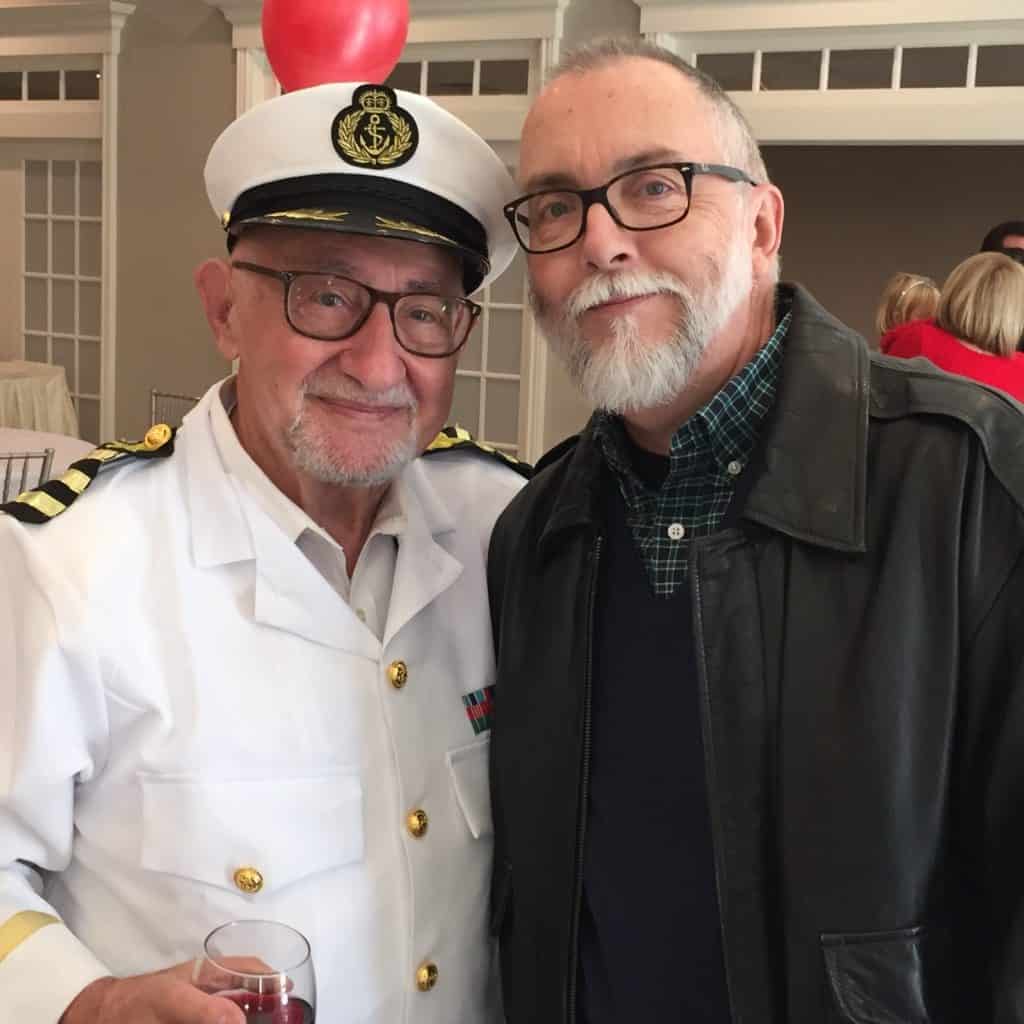

For five years, Holocaust survivor Charles Middleberg lived as a hidden child whose very survival relied on the kindness and quick thinking of strangers who took a young French-Jewish boy and his brother into secretive safekeeping without a second thought.
Middleberg’s parents and family were taken to concentration camps; while his father was among the liberated, his mother perished at Auschwitz II-Birkenau.
Yet the 90-year-old Marlton resident insists he is not a survivor.
“I am a witness,” Middleberg asserts in his gentle French accent. “All of these things happened to me, my family, my brother, my father, my mother, my uncles and aunts and cousins.”
Middleberg’s story is the basis for the recently published middle-grade novel in verse, “Small Miracle: A Holocaust Story from France.” Its 184 pages comprise the first book of longtime Marlton resident David Austin, who says the young adult novel became more and more relevant during its nearly four-year gestation period.
“Charles’ main focus is to talk to kids about hate and looking out for each other and standing up to injustice — he uses his story as a backdrop for all that,” Austin explained.
“You have to be the person who’s willing to step up if something’s not right. And I think we’ve lost the idea of that social contract of a common community responsibility to one another.”
Middleberg is accustomed to telling his story to a young audience: He’s spent the past 20 years speaking “to more schools than I can count,” as well as churches and colleges, in an effort to share what he witnessed with others. He feels schoolchildren especially need to understand how biases and unchecked prejudices can escalate into a path of violence glorified by hate groups, when it’s unity the world needs, not more division.
“Primarily, what I’m telling the children, is that terrible times can happen and the most important issue to avoid is joining a hate group,” Middleberg said. “There is no difference between any one of us, whether we’re yellow, red, white, green, whatever. We all have the same red blood. It is so much easier to give someone a hug and a kiss than to give them a punch. What do you gain from a punch? Kindness is so much better.”
“Children are easy to reach,” he added. What still shocks him are the adults who are gobsmacked by what he saw as a Jewish boy — a story, he added, where he edits out the worst atrocities for the sake of his young audience. They’re astonishingly empathetic, but they’re also innocents who don’t need to know the full extent of what he bore witness to.
“I am not telling them a horror story,” Middleberg explained. “I am telling them to stay away from hate groups because they eventually lead to horror stories.”
Austin, a longtime DeMasi Middle School teacher who retired last month after teaching English, then history, emphatically echoes children’s capacity for kindness and empathy.
“I used to walk on eggshells when I taught this unit,” he admitted. “But the kids really do take to their Holocaust education, as tough as is it at any age to wrap your head around what happened. But middle-schoolers have an amazing capacity for empathy, and they’ll never disappoint if you give them a chance to prove it.”
Austin and Middleberg actually connected through DeMasi. According to Austin, “New Jersey is the first state to mandate a Holocaust and genocide education,” giving middle-school social studies students an entire marking period’s perspective on a horror that ultimately saw tens of millions of Jews, Roma, Soviets, the handicapped, gay men and dissenters murdered at the hands of the Nazis between 1941 and 1945.
“What we’ve done for years in the 7th grade curriculum is give a significant amount of time to a unit on the Holocaust,” Austin said. “As part of that, we have a connection with the Jewish Community Center in Cherry Hill, and they have been forever supplying us with an annual visit from a local survivor.”
On more than one occasion, Middleberg was that witness to one of modern history’s darkest epochs. And during one fateful visit, as Austin was nearing retirement and considering how his “hard drive full of unfinished stories” would factor into the writer’s life he was certain would shape his next chapter, the proverbial lightbulb went off.
“I had gotten to know Charles after the first year he spoke to us,” Austin continued. “I’m sitting there listening to him tell his story for the second time, and a little voice in my head said, ‘Dave, this is the story you need to tell.’”
It took a little prodding and a preliminary draft to coax Middleberg into allowing Austin to be the steward of his story. Helen Kirschbaum, director of the Jewish Community Relations Council’s Esther Raab Holocaust Museum & Goodwin Education Center in Cherry Hill, was Middleberg’s chaperone that day — and an eager ally who said for decades that his story was meant to become a book.
“When I proposed the idea to Charles, she immediately turned to him, started poking her finger into his chest and said, ‘See, Charles? We’ve been telling you that for 25 years!’” Austin recalled.
It was the way Middleberg spoke of his experiences that resonated with Austin. The nonagenarian liberally attests to how blessed he is and how rich his life is, and that optimism has its roots in how complete strangers were guided by their better angels to save two young boys in a time when so many leaned into their lesser demons.
The result, Austin explained, is a magnetic personality that turns the horrors of what MIddleberg lived through into an opportunity to celebrate those people who are the brightest lights in a dark world.
“Charles has an incredible story and he is an amazing storyteller,” Austin said. “The kids, it’s like they’re listening to their favorite uncle or your best grandpa. They just fall in love with him after 45 minutes.”
Middleberg deeply values the evidence of how sharing his testimony with school children has affected them.
“I have an enormous accumulation of letters and pictures and all kinds of mementos from the schools I’ve gone to,” he said. “To me, it’s extremely rewarding because these children understand that I’m sharing my story not because of its horrors, but because of the incredible people in it.”
Austin believes that connection is facilitated by the fact that Middleberg, who was a 9-year-old when World War II came to France, was roughly the same age as the students he speaks to when he lived through the Holocaust.
“He talks about his younger brother and his parents and his relationship with them, which permeates the whole story,” Austin said. “That separation of his family, that’s a big part of it. Kids feel that even without living through Charles’ experience, because those are classic kid worries and they can relate that way.”
But it’s the book’s title that underscores the true message both Middleberg and Austin want to pass along to their young audience.
“The first time I heard him speak, he spoke of the small miracles of complete strangers who had an opportunity to act in one of two ways,” Austin recalled. “One way would have meant instant death for him. The other way meant risking themselves to help him, and in each case they chose the second. He uses that to show students that they always have the chance to choose what’s right and be the person who helps make the world a better place.”
Because, as Middleberg sees it, leading by example is how one person can make a lasting impact.
“I know my time is limited, so I want to make it meaningful,” he said. “I talk about what I have witnessed in the hope that it never happens again.”
Austin — whom Middleberg calls “my best friend” — is thrilled that “Small Miracle” is out in the world now so others can bear witness to Middleberg’s story.
But there is an even greater personal reward.
“I get to have Charles as a friend,” Austin said. “And I am a better person for knowing him.”
“Small Miracle” is available on both Amazon and at barclaypressbookstore.com/Small-Miracle.html.









